Monthly Archives: December 2018
 One of the funniest parts of a movie or television program is the bloopers…the many takes that were completely blown. We have all laughed at the hilarity of it all. Well, in my years of writing, I can tell you that movies and television programs aren’t the only places that one finds bloopers. Normally, I proofread my stories before I post them, and I usually catch most errors. Nevertheless, like most editors, it pays to have a backup plan. For me, that backup plan is some of my readers. My sister, Cheryl Masterson is my main backup proofreader, and she has picked up some doozies!!
One of the funniest parts of a movie or television program is the bloopers…the many takes that were completely blown. We have all laughed at the hilarity of it all. Well, in my years of writing, I can tell you that movies and television programs aren’t the only places that one finds bloopers. Normally, I proofread my stories before I post them, and I usually catch most errors. Nevertheless, like most editors, it pays to have a backup plan. For me, that backup plan is some of my readers. My sister, Cheryl Masterson is my main backup proofreader, and she has picked up some doozies!!
From botched math, resulting in the wrong age being listed for one of the subjects, such as saying that my Uncle George was 94, when in reality he was 92, to botched spellcheck resulting in a totally wrong word in a sentence making it say something completely wrong and usually goofy, Cheryl has seen it all. She caught one the other day, where I called my Aunt Evelyn…Aunt Evenly. Invariably, I will get a text telling me that I have a blooper in my story. I am grateful that Cheryl usually reads my story pretty quickly after I post it, meaning that a minimal number of people have seen that embarrassing blooper. Nevertheless, some have seen it and I’m sure they laughed  about some of them. Sometimes it isn’t really a blooper, but rather calling something a name that could embarrass the subject. Such was the case with a story about my great grand niece who loves lip balm. It was ok to call it lip balm, until I said it belonged to her daddy. After that I was informed that it was chap stick, because men would never use lip balm. Hahahahaha!! Needless to say, my sister missed that one, but her daughter Chantel Balcerzak and grandson, Jake Harman certainly didn’t.
about some of them. Sometimes it isn’t really a blooper, but rather calling something a name that could embarrass the subject. Such was the case with a story about my great grand niece who loves lip balm. It was ok to call it lip balm, until I said it belonged to her daddy. After that I was informed that it was chap stick, because men would never use lip balm. Hahahahaha!! Needless to say, my sister missed that one, but her daughter Chantel Balcerzak and grandson, Jake Harman certainly didn’t.
Every year I have bloopers in my stories. It is inevitable, l suppose. Then, a few days ago Cheryl suggested that I should write a story about the bloopers. I must say that I was intrigued with the idea. Of course, if I am to continue a yearly blooper story, I will have to keep better track of the many bloopers for the year. Whether I am able to relay them all to my readers or not, I know that for those who catch them, and for me, the bloopers do add a little laughter to my blogs and my days.
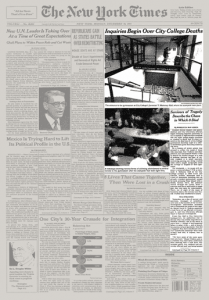 There are many ways to get hurt, but one of the most dangerous is the stampede. Caused by people pushing the people in front of them. It can lead to serious crush injuries. In December of 1991, at a City College gymnasium in New York, New York, a benefit basketball game was being held to benefit AIDS education. In a zealous attempt to bring in as much money as possible, the facility was jammed with as many as 2,000 people over capacity. To make matters worse, a group of gate-crashers tried to push their way into the already overcrowded gymnasium. Thus sparked a stampede that crushed hundreds of ticketholders at the bottom of a basement staircase. Most of the injuries happened near the door to an underground gym that was packed with thousands of spectators.
There are many ways to get hurt, but one of the most dangerous is the stampede. Caused by people pushing the people in front of them. It can lead to serious crush injuries. In December of 1991, at a City College gymnasium in New York, New York, a benefit basketball game was being held to benefit AIDS education. In a zealous attempt to bring in as much money as possible, the facility was jammed with as many as 2,000 people over capacity. To make matters worse, a group of gate-crashers tried to push their way into the already overcrowded gymnasium. Thus sparked a stampede that crushed hundreds of ticketholders at the bottom of a basement staircase. Most of the injuries happened near the door to an underground gym that was packed with thousands of spectators.
The problem with this type of situation is the the people in front get pressed tightly between a wall, and the people behind them. Chief medical examiner, Charles Hirsch said, “the eight people killed all were asphyxiated…squeezed front to back…in the stairwell.” The victims included three women and five men and ranged in age from 16 to 28…Sonia Williams 20, Leonard Nelson 17, Dirk Swain 20, Charise Noel, Jubal Rainey 15, Yul Dargan 24, and Darren Brown 29, were among the dead. Videotape shot from the bleachers revealed a seriously overcrowded gymnasium…at least 2,000 people more than its legal capacity of 2,730 and that tickets were still being sold at the door. “It was oversold,” said Mayor David Dinkins.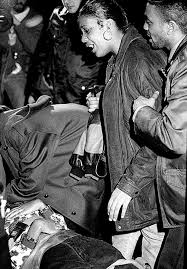
The stampede pushed most of the victims down the stairs, squeezed them through a doorway and onto the gym floor. They tripped and fell over others waiting there, only to be crushed themselves by the next human wave. “It was a cone effect,” said ambulance worker Sy Collins. “The door opens and there were bodies on the floor and people were just running over them.” Bodies piled up as many as six high. The 29 people who sustained crushing injuries included five Emergency Medical Service staffers, some of whom were mauled as the crowd fought over their services.
According to authorities and witnesses, by late afternoon thousands of people had lined up outside the City College gym in upper Manhattan for what was billed as the “Heavy D and Puff Daddy Celebrity Charity Basketball Game” to benefit AIDS education. The teams were to be captained by Heavy D and Puff Daddy, both rap stars. A recorded telephone message told callers that all of the $12 advance tickets had been sold, but that tickets could be bought at the door for $20. Chief of Patrol Mario Salvaggi said the school’s security director called the police before the game and asked for help because the event was sold out. Police who arrived at 5:00 p.m. found a crowd of between 500 and 700 were milling around outside on Convent Avenue. The game was scheduled to start at 6:00 p.m., and the doors opened at 5:00 p.m. Ticketholders passed through a glass door at street level, walked down a 12 foot wide staircase, and passed through a single metal door into the 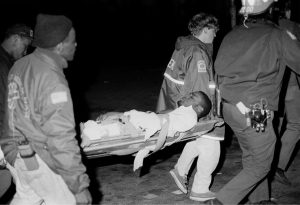 gym. By 7:00 p.m., the game still had not started, and people out on the street began pushing to get inside. A locked glass door was smashed, and people rushed into the gym building. Randy Jones, 30, of the Bronx who was standing inside the door to the gym, said that a woman collecting money at the door got up, took a can holding the night’s receipts, ran into the gym and closed the metal doors behind her, leaving the crowd up in the stairwell. Eventually event organizers began letting people from the stairwell into the gym, but only a few at a time, Jones said. Finally people from the stairs began streaming into the gym, colliding with scores standing inside the door. Soon the floor was covered with injured people.
gym. By 7:00 p.m., the game still had not started, and people out on the street began pushing to get inside. A locked glass door was smashed, and people rushed into the gym building. Randy Jones, 30, of the Bronx who was standing inside the door to the gym, said that a woman collecting money at the door got up, took a can holding the night’s receipts, ran into the gym and closed the metal doors behind her, leaving the crowd up in the stairwell. Eventually event organizers began letting people from the stairwell into the gym, but only a few at a time, Jones said. Finally people from the stairs began streaming into the gym, colliding with scores standing inside the door. Soon the floor was covered with injured people.
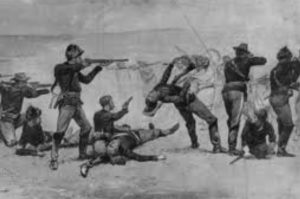 We hear many things about the different Indian Wars and battles. We also know that many of these wars were unnecessary, and were largely due to broken treaties that were made between the White Man and the Indians. Because the population of the United States was inevitable, I don’t know how we could have possibly left so much land exclusively for the use if the Indians, but there must have been better ways to work this out. Nevertheless, once a population explosion starts, it is impossible to stop it.
We hear many things about the different Indian Wars and battles. We also know that many of these wars were unnecessary, and were largely due to broken treaties that were made between the White Man and the Indians. Because the population of the United States was inevitable, I don’t know how we could have possibly left so much land exclusively for the use if the Indians, but there must have been better ways to work this out. Nevertheless, once a population explosion starts, it is impossible to stop it.
Of further concern to the government were the spiritual beliefs of the Indians. Throughout 1890, the United States government worried about the increasing influence at Pine Ridge of the Ghost Dance spiritual movement. The movement taught that the Indians had been defeated and confined to reservations because they had angered the gods by abandoning their traditional customs. This movement prompted many Sioux Indians to believed that if they practiced the Ghost Dance and rejected the ways of the white man, the gods would create the world anew and destroy all non-believers, including non-Indians.
The situation escalated when on December 15, 1890, reservation police tried to arrest Sitting Bull, the famous Sioux chief, because they mistakenly believed he was a Ghost Dancer. In the process of his arrest, they killed him, thereby increasing the tensions at Pine Ridge. Then, on December 29, the U.S. Army’s 7th Cavalry surrounded a band of Ghost Dancers under Big Foot, a Lakota Sioux chief, near Wounded Knee Creek. They demanded the Indians surrender their weapons. Immediately, a fight broke out between an Indian and a U.S. 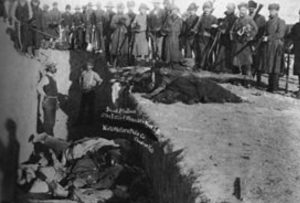 soldier. A shot was fired, but it’s unclear who fired first. A brutal massacre followed, in which it’s estimated that between 150 and 300 Indians were killed, nearly half of them women and children. The cavalry lost 25 men. The conflict at Wounded Knee was originally referred to as a battle, but in reality it was a tragic and avoidable massacre. Surrounded by heavily armed troops, it’s unlikely that Big Foot’s band would have intentionally started a fight. Some historians speculate that the soldiers of the 7th Cavalry were deliberately taking revenge for the regiment’s defeat at Little Bighorn in 1876. Whatever the motives, the massacre ended the Ghost Dance movement and was the last major battle in America’s deadly war against the Plains Indians.
soldier. A shot was fired, but it’s unclear who fired first. A brutal massacre followed, in which it’s estimated that between 150 and 300 Indians were killed, nearly half of them women and children. The cavalry lost 25 men. The conflict at Wounded Knee was originally referred to as a battle, but in reality it was a tragic and avoidable massacre. Surrounded by heavily armed troops, it’s unlikely that Big Foot’s band would have intentionally started a fight. Some historians speculate that the soldiers of the 7th Cavalry were deliberately taking revenge for the regiment’s defeat at Little Bighorn in 1876. Whatever the motives, the massacre ended the Ghost Dance movement and was the last major battle in America’s deadly war against the Plains Indians.
 Earthquakes can happen anywhere, but there are areas that are more prone to earthquakes than other areas. When we think about that, we think of Alaska, California, or Japan, all of which experience daily earthquakes. Of course, there are many other places that get a lot of earthquakes. One such place is in Italy. The area around Sicily and Calabria are known as la terra ballerina, “the dancing land,” for the periodic seismic activity that strikes the region. I would have thought that with 12,000 earthquakes a year in Alaska, or 10,000 earthquakes a year in California, or 1,500 earthquakes in Japan, that any of these places would be called “the dancing land” before the area of Sicily and Calabria, which doesn’t have nearly as many.
Earthquakes can happen anywhere, but there are areas that are more prone to earthquakes than other areas. When we think about that, we think of Alaska, California, or Japan, all of which experience daily earthquakes. Of course, there are many other places that get a lot of earthquakes. One such place is in Italy. The area around Sicily and Calabria are known as la terra ballerina, “the dancing land,” for the periodic seismic activity that strikes the region. I would have thought that with 12,000 earthquakes a year in Alaska, or 10,000 earthquakes a year in California, or 1,500 earthquakes in Japan, that any of these places would be called “the dancing land” before the area of Sicily and Calabria, which doesn’t have nearly as many.
Nevertheless, the name was given and it stuck. While it may not have as many, the ones that hit there seem to be especially devastating. In 1693, 60,000 people were killed in southern Sicily by an earthquake, and in 1783 most of the Tyrrenian coast of Calabria was leveled by a massive earthquake that  killed 50,000. The quake of 1908 was particularly costly in terms of human life because it struck at at dawn, catching most people at home in bed rather than in the relative safety of the streets or fields. The December 28, 1908 earthquake which struck at 5:20am was the most destructive earthquake in recorded European history strikes the Straits of Messina in southern Italy. The cities of Messina in Sicily and Reggio di Calabria on the Italian mainland were leveled by the devastating quake. The earthquake and tsunami it caused killed an estimated 100,000 people. The main shock registered an estimated 7.5 magnitude on the Richter scale. It caused a devastating tsunami with 40-foot waves that washed over coastal towns and cities. The two major cities on either side of the Messina Straits–Messina and Reggio di Calabria, had about 90 percent of their buildings destroyed. The quake cut telegraph lines and damaged railway lines, seriously slowing down the relief efforts. To make matters worse, many of the remaining buildings were destroyed by hundreds of smaller
killed 50,000. The quake of 1908 was particularly costly in terms of human life because it struck at at dawn, catching most people at home in bed rather than in the relative safety of the streets or fields. The December 28, 1908 earthquake which struck at 5:20am was the most destructive earthquake in recorded European history strikes the Straits of Messina in southern Italy. The cities of Messina in Sicily and Reggio di Calabria on the Italian mainland were leveled by the devastating quake. The earthquake and tsunami it caused killed an estimated 100,000 people. The main shock registered an estimated 7.5 magnitude on the Richter scale. It caused a devastating tsunami with 40-foot waves that washed over coastal towns and cities. The two major cities on either side of the Messina Straits–Messina and Reggio di Calabria, had about 90 percent of their buildings destroyed. The quake cut telegraph lines and damaged railway lines, seriously slowing down the relief efforts. To make matters worse, many of the remaining buildings were destroyed by hundreds of smaller 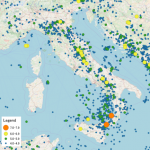 tremors over subsequent days. These tremors injured or killed rescuers. On December 30, King Victor Emmanuel III arrived aboard the battleship Napoli to inspect the devastation.
tremors over subsequent days. These tremors injured or killed rescuers. On December 30, King Victor Emmanuel III arrived aboard the battleship Napoli to inspect the devastation.
To make matters worse, a steady rain fell on the ruined cities, forcing the dazed and injured survivors, clad only in their nightclothes, to take shelter in caves, grottoes, and impromptu shacks built out of materials salvaged from the collapsed buildings. Veteran sailors could barely recognize the shoreline because long stretches of the coast had sunk several feet into the Messina Strait. The devastation was horrific. After all that, I can see why it is called la terra ballerina, “the dancing land.”

My husband’s aunt, Esther Hein lives in Oregon, and it’s not always easy for her to get back home to Forsyth, Montana to visit her brothers, Eddie and Butch Hein, who live there with their families. Last January she made the trip, and once she was there, she might have found herself wondering if January was the best time to have done that. Montana gets quite a bit of snow, and last January was no exception. They got a large amount of snow, and Esther found herself shoveling the sidewalks and not really getting anywhere with removing all the snow. In the end, they spent a lot of time indoors, but it was a very nice visit anyway.
Things got a little tough for Esther this past fall, when he got Shingles. If you have  never dealt with Shingles, or had them yourself, you have no idea how bad they really are. my husband had them in February of 2013, and they were awful.They itch and burn at the same time. They leave scars that never seem to completely go away. Some people get physically ill, and unfortunately, Esther was one of those. She was really sick for a while, and that can take a long time to come back from. I’m sure she was weak for a while.
never dealt with Shingles, or had them yourself, you have no idea how bad they really are. my husband had them in February of 2013, and they were awful.They itch and burn at the same time. They leave scars that never seem to completely go away. Some people get physically ill, and unfortunately, Esther was one of those. She was really sick for a while, and that can take a long time to come back from. I’m sure she was weak for a while.
As winter approached, Esther began to feel better, and was able to go on the family’s annual trip to the Diamond Lake Resort to go snow shoeing. I’m sure that with how she had been feeling, she wasn’t sure she would feel up to going this year, but I’m glad she did. Esther likes to stay in good shape. It is important for all  of us. She has taken up water exercise. There is an aquatic open pool near her home and she has been going there three times a week to do open end exercises. Esther loves going, and says that she feels so much better these days.
of us. She has taken up water exercise. There is an aquatic open pool near her home and she has been going there three times a week to do open end exercises. Esther loves going, and says that she feels so much better these days.
Esther has long been a crafty person, and she has plans to make some quilts this next year. When you don’t feel well, you can’t do justice to your hobbies. Esther is an artist,and in the past has don’t quite a bit of painting. I’m just thankful that her hobbies have not had to be laid aside. Today is Esther’s 78th birthday. Happy birthday Esther!! Have a great day!! We love you!!
 There is a tradition in England and a few other nations like Canada and Ireland, that takes place the day after Christmas, called Boxing Day. It is an odd name for a holiday, but I think the purpose of the holiday far outweighs the name of the holiday. People might argue the original purpose of the holiday, but the most straightforward answer as to what it is about would be that, “We are a little greedy here in the England and Ireland in wanting a more extended holiday. It is not enough for us to have only Christmas Day celebrations, we have added to this another event called Boxing Day.” That might be one part of the picture, but the full answer is not that simple. But firstly, it has nothing to do with the sport of boxing.
There is a tradition in England and a few other nations like Canada and Ireland, that takes place the day after Christmas, called Boxing Day. It is an odd name for a holiday, but I think the purpose of the holiday far outweighs the name of the holiday. People might argue the original purpose of the holiday, but the most straightforward answer as to what it is about would be that, “We are a little greedy here in the England and Ireland in wanting a more extended holiday. It is not enough for us to have only Christmas Day celebrations, we have added to this another event called Boxing Day.” That might be one part of the picture, but the full answer is not that simple. But firstly, it has nothing to do with the sport of boxing.
Boxing Day is a national Bank Holiday. It is a day to spend with family and friends and to eat up all the leftovers of Christmas Day, but there is more to it than that. The origins of the day are filled with history and tradition. People have long disputed the origins of the name Boxing Day. The name is actually a reference to holiday gifts. A “Christmas Box” in Britain is a name for a Christmas present. Boxing Day was traditionally a day off for the servants and the day when they received a “Christmas Box” from the master. The servants would also go home on Boxing Day to give “Christmas Boxes” to their families.
Traditionally, a box to collect money for the poor was placed in churches on Christmas day. The boxes were  opened the next day…Boxing Day. The name refers to a nautical tradition. Great sailing ships when setting sail would have a sealed box containing money on board for good luck. Were the voyage a success, the box was given to a priest, opened at Christmas and the contents then given to the poor. Boxing Day is the 26th December is a national holiday in England and Ireland.
opened the next day…Boxing Day. The name refers to a nautical tradition. Great sailing ships when setting sail would have a sealed box containing money on board for good luck. Were the voyage a success, the box was given to a priest, opened at Christmas and the contents then given to the poor. Boxing Day is the 26th December is a national holiday in England and Ireland.
Boxing Day is a time to spend with family or friends, but usually not those seen on Christmas Day itself. In recent times, the day has begun to include many sports. Horse racing is particularly popular with meets all over the country. Many top football teams also play on Boxing Day. Boxing Day is a time when the British show their eccentric side by taking part in all kinds of silly activities. Bizarre traditions include swimming the icy cold English Channel, fun runs, and charity events. Until 2004, Boxing Day hunts were a traditional part of the day, but the ban on fox hunting has put an end to this in its usual sense. Hunters will still gather dressed resplendently in red hunting coats to the sound of the hunting horn. But, since it is now forbidden to chase the fox with dogs, they now follow artificially laid trails.
Another “sport” to emerge in recent years is shopping. Sadly, what was once a day of relaxation and family time sees the start of the sales. Sales used to start in January, post-New Year, but the desire to grab a bargain and for shops to off-load stock means many now begin on Boxing Day. This tradition makes me especially sad, because it is like Black Friday. By moving Black Friday shopping to Thanksgiving, and now post Christmas sales to Boxing Day, have soured many people to shopping on these days, and the whole purpose is defeated.

In Ireland, Boxing Day is also known as “Saint Stephen’s Day” named after the Saint stoned to death for believing in Jesus. In Ireland on Boxing, there was once a barbaric act carried out by the so-called “Wren Boys.” These boys would dress up and go out, and stone wren birds to death then carry their catch around the town knocking on doors and asking for money, the stoning representing what had happened to Saint Stephen. This terrible tradition has now stopped, thank goodness, but the Wrens Boys still dress up. Now, instead they parade around town and collect money for charity. I’m thankful that such a barbaric tradition, has now taken on a new look, and is now used for good.
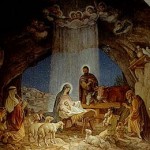 When most people think of Christmas, their minds think of Santa Clause, turkey dinners, and weeks of preparatory shopping, and yes those things are a part of Christmas for most people, but there is a far more important reason for the Christmas season…the birth of our Saviour, Jesus Christ, the Lord. Yes, I am aware that we don’t know the exact date of our Saviour’s birth, and many are quite certain that it was nowhere near December 25th, and in reality, not in winter. To most Christians, however, those minor details don’t matter, because we are talking about our Lord. It’s ok to celebrate Jesus anytime.
When most people think of Christmas, their minds think of Santa Clause, turkey dinners, and weeks of preparatory shopping, and yes those things are a part of Christmas for most people, but there is a far more important reason for the Christmas season…the birth of our Saviour, Jesus Christ, the Lord. Yes, I am aware that we don’t know the exact date of our Saviour’s birth, and many are quite certain that it was nowhere near December 25th, and in reality, not in winter. To most Christians, however, those minor details don’t matter, because we are talking about our Lord. It’s ok to celebrate Jesus anytime.
Most Christians think of gift giving as being symbolic of the greatest gift ever given…Jesus who came to earth to save us from our sin filled world by dying on the cross so that we would be able to go Heaven. Of course, no gift we could ever give could measure up to the gift Jesus gave us, but we can celebrate Jesus by having a giving spirit. After all, that is what Jesus was all about. I don’t mean presents, but rather the ultimate gift, the greatest love ever given…”For God so loved the world that He gave His only begotten Son, that whoever believes in Him should not perish but have everlasting life.” John 3:16. What great gift could there ever be than to give His life so that we could live, and what greater reason could there ever be to celebrate Jesus. The date error, if there is one, makes no difference…just God’s love.

Christmas means different things to different people, of course, but I think that the most important thing is to make sure that we don’t lose sight of the real reason for the season…the birth of the Saviour of the world. Before Jesus came,we had no hope. We were lost, and going to Hell. After Jesus lived, died, and rose again, everything changed and hope returned. For Christians, there is nothing more important. Jesus is our advocate with the Father. He is the the true meaning o grace. His git to us…salvation, was not something we could ever earn. we were lost and all hope was gone. Then Jesus was born, and we had a reason to celebrate again. Happy birthday Jesus, and Merry Christmas everyone.
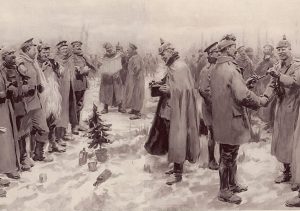 It was 1914, and World War I was in the 5th month of a 51 month offensive. The war effort was in a bit of a transition period, following the stalemate of the Race to the Sea and the indecisive result of the First Battle of Ypres. As leadership on both sides reconsidered their strategies, hostilities entered a bit of a lull. The men were hoping for a break in the action for Christmas that year, but they had to wait for their orders. When the orders came down, it was not to be a Christmas truce, but rather a Christmas strike. As the first men to go forth prepared to make the first advances, some men were killed, and some returned. It was the way of war. The leadership wanted to take advantage of the possibility that the enemy might not expect a Christmas attack. One of the younger men…17 years old to be exact, couldn’t help himself. He began to sing Silent Night.His superiors ordered it to be quiet. They feared that the enemy was waiting in the darkness.
It was 1914, and World War I was in the 5th month of a 51 month offensive. The war effort was in a bit of a transition period, following the stalemate of the Race to the Sea and the indecisive result of the First Battle of Ypres. As leadership on both sides reconsidered their strategies, hostilities entered a bit of a lull. The men were hoping for a break in the action for Christmas that year, but they had to wait for their orders. When the orders came down, it was not to be a Christmas truce, but rather a Christmas strike. As the first men to go forth prepared to make the first advances, some men were killed, and some returned. It was the way of war. The leadership wanted to take advantage of the possibility that the enemy might not expect a Christmas attack. One of the younger men…17 years old to be exact, couldn’t help himself. He began to sing Silent Night.His superiors ordered it to be quiet. They feared that the enemy was waiting in the darkness.
Then, a miracle occurred. In the week leading up to the 25th of December, French, German, and British soldiers crossed trenches to exchange seasonal greetings…and to talk. In some areas, men from both sides ventured into what was called no man’s land, because to go there was to risk death. Nevertheless, on that Christmas Eve and Christmas Day, things seemed different. The soldiers took a chance and stepped forward, hoping to convince their enemies that they only wanted to bury their dead, and hoping that it would be 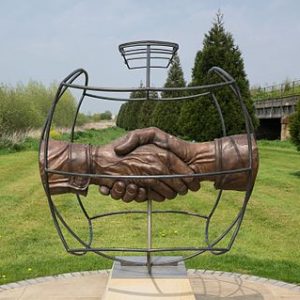 agreeable to stop the fighting for one hour to bury the dead. As they buried their dead, with heavy hearts, someone suggested that they take Christmas Day off. This was totally against their orders, and they knew that at some point they were going to have to go back and follow their orders. They were going to have to become enemies again. Still, for now…for this day, they mingled and exchange food and souvenirs. There were joint burial ceremonies and prisoner swaps. Men played games of football with one another, giving one of the most memorable images of the truce. Peaceful behavior was not ubiquitous, however, and fighting continued in some sectors, while in others the sides settled on little more than arrangements to recover bodies. Several meetings ended in carol-singing. Someone commented, “How many times in a life do you actually meet your enemy face to face.” It was almost strange to them, because these “enemies” were not the monsters they expected them to be. These were simply men, just like they were. I’m sure the men were in shock. it’s hard to have your total view of your enemy change so drastically and then have to follow your orders, pickup your weapons, and shoot at the same men again. The Christmas truce (German: Weihnachtsfrieden; French: Trêve de Noël) was a series of widespread but unofficial ceasefires along the Western Front of World War I around Christmas 1914.
agreeable to stop the fighting for one hour to bury the dead. As they buried their dead, with heavy hearts, someone suggested that they take Christmas Day off. This was totally against their orders, and they knew that at some point they were going to have to go back and follow their orders. They were going to have to become enemies again. Still, for now…for this day, they mingled and exchange food and souvenirs. There were joint burial ceremonies and prisoner swaps. Men played games of football with one another, giving one of the most memorable images of the truce. Peaceful behavior was not ubiquitous, however, and fighting continued in some sectors, while in others the sides settled on little more than arrangements to recover bodies. Several meetings ended in carol-singing. Someone commented, “How many times in a life do you actually meet your enemy face to face.” It was almost strange to them, because these “enemies” were not the monsters they expected them to be. These were simply men, just like they were. I’m sure the men were in shock. it’s hard to have your total view of your enemy change so drastically and then have to follow your orders, pickup your weapons, and shoot at the same men again. The Christmas truce (German: Weihnachtsfrieden; French: Trêve de Noël) was a series of widespread but unofficial ceasefires along the Western Front of World War I around Christmas 1914.
The Christmas Truces of 1914, while wonderful for the men, were not to be a Christmas tradition in World War I. The following year, a few units arranged ceasefires but the truces were not nearly as widespread as in 1914. 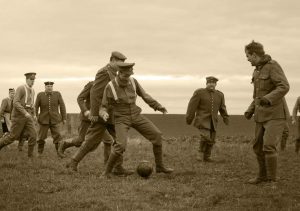 This was, in part, due to strongly worded orders from the high commands of both sides prohibiting truces. It was evident that while the mini-mutiny of 1914 was tolerated and the men were not punished, that this would not be tolerated in the future. It really didn’t matter, because the Soldiers were no longer amenable to truce by 1916. The war had become increasingly bitter after devastating human losses suffered during the battles of the Somme and Verdun, and the use of poison gas. While a Christmas truce would be nice in theory, bitter and angry feelings on both sides of a war make it an impractical idea. Still, in 1914, the miracle of the Christmas Truce was a wonderful treat for the men on all sides of a bitter war.
This was, in part, due to strongly worded orders from the high commands of both sides prohibiting truces. It was evident that while the mini-mutiny of 1914 was tolerated and the men were not punished, that this would not be tolerated in the future. It really didn’t matter, because the Soldiers were no longer amenable to truce by 1916. The war had become increasingly bitter after devastating human losses suffered during the battles of the Somme and Verdun, and the use of poison gas. While a Christmas truce would be nice in theory, bitter and angry feelings on both sides of a war make it an impractical idea. Still, in 1914, the miracle of the Christmas Truce was a wonderful treat for the men on all sides of a bitter war.
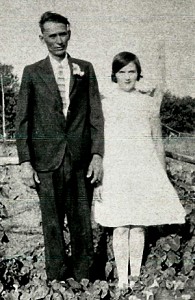 The Christmas season is always exciting, for old and young alike, and Christmas Eve is often a very hard day to settle down for. The reasons for the excitement vary. They are usually centered around the Christmas holiday, but not always. For my mother’s family, Christmas Eve holds an extra special significance because it was also their parents, wedding anniversary. Grandma Hattie and Grandpa George Byer were married on December 24, 1927. I always wondered why people would pick a holiday to get married on, but in times past, it was somewhat common. People could not easily get all their family members into town for a wedding, but people were often already getting together for a holiday. Of course, weddings weren’t often the great big affair that they can be these days either. Often the bride simply wore her Sunday dress, and carried a bouquet of wild flowers. I suppose it would be similar to the weddings held at the justice of the peace these days.
The Christmas season is always exciting, for old and young alike, and Christmas Eve is often a very hard day to settle down for. The reasons for the excitement vary. They are usually centered around the Christmas holiday, but not always. For my mother’s family, Christmas Eve holds an extra special significance because it was also their parents, wedding anniversary. Grandma Hattie and Grandpa George Byer were married on December 24, 1927. I always wondered why people would pick a holiday to get married on, but in times past, it was somewhat common. People could not easily get all their family members into town for a wedding, but people were often already getting together for a holiday. Of course, weddings weren’t often the great big affair that they can be these days either. Often the bride simply wore her Sunday dress, and carried a bouquet of wild flowers. I suppose it would be similar to the weddings held at the justice of the peace these days.
The reasons for the date and the simplicity of a wedding really didn’t make much difference, especially concerning my grandparents, because they were very much in love all of the years of their married lives together. I still remember all the times that Grandpa looked at Grandma with total love in his eyes. Grandma always knew that Grandpa loved her very much. Their marriage was blessed with nine children, four of whom are now in Heaven with them. They also have five sons-in-law and several grandchildren and great grandchildren in Heaven with them too. I would imagine that all of them are having a wonderful time there, because there are no tears and no sadness there. Of course, we here, who are left behind miss all of them terribly, and can’t wait to see them again.
Grandpa was a hard worker, who held many jobs in his lifetime. He was always a very respected worker. They 
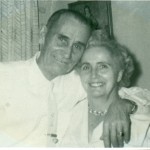 knew he could be counted on to be there and to do his job well. Grandma was always a stay-at-home mom, who never learned to drive a car. It was just something she saw no need for. She worked in the home, and she cooked…man could she cook!! And there was always plenty of food on her table…no matter how many extras might show up. No one was turned away, and Grandma’s table was famous in this area. Today would have been my grandparents’ 91st anniversary. Happy anniversary in Heaven, Grandma and Grandpa. We love and miss you both very much.
knew he could be counted on to be there and to do his job well. Grandma was always a stay-at-home mom, who never learned to drive a car. It was just something she saw no need for. She worked in the home, and she cooked…man could she cook!! And there was always plenty of food on her table…no matter how many extras might show up. No one was turned away, and Grandma’s table was famous in this area. Today would have been my grandparents’ 91st anniversary. Happy anniversary in Heaven, Grandma and Grandpa. We love and miss you both very much.
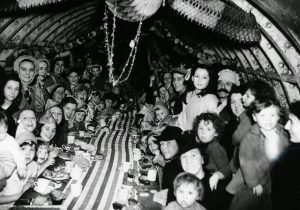 When disaster strikes, and homes are in ruin, people try to come together to help return a sense of normalcy to the people affected by the disaster. Disasters happen quickly, and the devastation is often heavy. It is a difficult thing to help people heal. While one disaster or event is often the same as another in terms of damage, something we somehow don’t connect to that same kind of devastation, is war. I’m not sure why, but when I think of war,I picture a battle held in the middle of a vast desert, with no civilization in sight. of course, when I really think about it, I now that is not reality, but rather my mind trying to fit war into a box of civility. In reality, there is nothing civil about war. Gun shots, bombs, and land mines aren’t picky about who they hit. Soldier or civilian…all are fair game in a war. And towns…well, there is often little to nothing left after a bomb hits.
When disaster strikes, and homes are in ruin, people try to come together to help return a sense of normalcy to the people affected by the disaster. Disasters happen quickly, and the devastation is often heavy. It is a difficult thing to help people heal. While one disaster or event is often the same as another in terms of damage, something we somehow don’t connect to that same kind of devastation, is war. I’m not sure why, but when I think of war,I picture a battle held in the middle of a vast desert, with no civilization in sight. of course, when I really think about it, I now that is not reality, but rather my mind trying to fit war into a box of civility. In reality, there is nothing civil about war. Gun shots, bombs, and land mines aren’t picky about who they hit. Soldier or civilian…all are fair game in a war. And towns…well, there is often little to nothing left after a bomb hits.
During World War II, London was often the targets of the German Luftwaffe, and the bombs they dropped, devastated many parts of London. From September 7, 1940, London was systematically bombed by the Luftwaffe for 56 out of the following 57 days and nights, in what was called “The Blitz.” Most notable was a large daylight attack against London on September 15th. Of course, these weren’t the only bombings, and the people of London didn’t know when or if it was safe to be out of the bomb shelters. Life in London had taken on eerie gloom,as people continued to seek refuge in the bomb shelters, because that was the only safe place to be. The biggest problem was that the bomb shelters were also gloomy, boring, and generally depressing. The children probably suffered the most, because kids don’t really understand all this hatred and killing. Their world had been turned upside down…and they didn’t know why.
By the end of 1940, 24,000 civilians had been killed in the Blitz and hundreds of thousands made homeless. In November, German bombers had obliterated Coventry city center and there had been particularly fierce raids on Manchester and Liverpool in the days leading up to Christmas. The public were now mourning the loss of their loved ones on the home front and in combat, as well as praying for the 41,000 British soldiers captured on the continent, but it was the children, in my mind, who suffered the most. Their childlike innocence was completely destroyed, along with their homes. Their parents, and other adults made the decision to change their little world, even if it was only for a short time. They didn’t have much, but they put together whatever they could to lift the spirits of these scared children. Christmas parties were held for the children and the shelter walls were decorated with paper chains and decorations, while amateur singing nights, discussion groups, and sewing circles were held regularly.
In order to avoid the bombs, many families spent some of the holidays in air-raid shelters and other places of refuge. They decked out their temporary homes with makeshift decorations…and very short Christmas trees because of the height of the shelters. Even if gas or electricity was available, Christmas dinner would have still been an amazing feat, because turkey was so expensive. Most people made do with other cuts of meat, which were still expensive. A family of four’s weekly meat ration probably wouldn’t even cover the cost of a small chicken. One alternative was home-raised chickens or rabbits, much to the shock of young children who often regarded them as pets. Home-grown vegetables and chutneys would have also made the table. Rations were 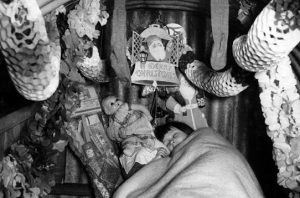 scrimped and saved including ham, bacon, butter, suet, and margarine. The tea and sugar rations were increased in the week before Christmas. Very little fruit was imported and nuts were very costly. Consequently, cooks had to improvise Christmas cakes and puddings devoid of dried fruit and marzipan, using instead sponge or other unlikely ingredients. Alcohol was available but, horribly expensive. And there would be no after-dinner French cheeses or brandy due to the German occupation. It was a poor Christmas party in comparison to those in the past, but it served to remind all the people that Christmas is more about the blessings in life, than it is about the things we are given.
scrimped and saved including ham, bacon, butter, suet, and margarine. The tea and sugar rations were increased in the week before Christmas. Very little fruit was imported and nuts were very costly. Consequently, cooks had to improvise Christmas cakes and puddings devoid of dried fruit and marzipan, using instead sponge or other unlikely ingredients. Alcohol was available but, horribly expensive. And there would be no after-dinner French cheeses or brandy due to the German occupation. It was a poor Christmas party in comparison to those in the past, but it served to remind all the people that Christmas is more about the blessings in life, than it is about the things we are given.

